“Games Like Scrabble”
For a lot of board gamers out there, we’ve got shelves full of games that we’ve picked up at places like Target or Barnes & Noble – each representing a different play style and different mechanics. The question is: where do you go next? If you like Game A, then what other game should you get to build upon that?
Now, if you’ve read any of our previous step ladder pieces, you’ll notice a progression of games from fairly standard and easy to progressively more obscure and more difficult. Today’s going to be a little different. Our first board game step ladders article was very well received and it sparked quite the discussion on Reddit. In that discussion, someone made the point that not only can one travel up a step ladder, but they can travel down it as well. So, today, we’re going to be starting at the top step and traveling backward. The reasons why will become clear. In today’s Step Ladder, the theme is wordplay.
If there’s one thing that we all share in common, it’s the necessity of communication and nothing gets the idea across so well as the right set of words. What we don’t all share in common is our lexiconic knowledge. Some of us are veritable dictionaries able to rattle off words and phrases with sesquipedalian flare while others of us are much less verbose. Regardless of your own personal level of wordsy confidence, wordplay can be a very rewarding and fun experience. So, let’s talk about that.
Scrabble → Paperback → Unspeakable Words
Scrabble
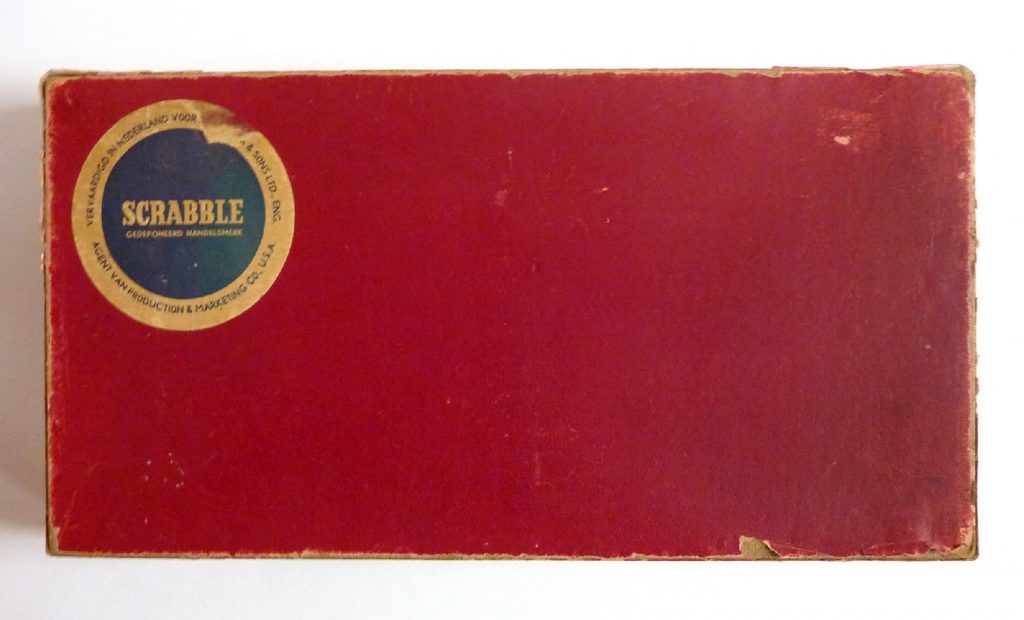
When it comes to board games that feature a lot of wordplay, it’s hard to find one better than Scrabble. Scrabble’s a game that rewards preparation and thoughtful, skillful play. It’s positively brimming with strategic opportunities. The game was invented in 1938 by a man named Alfred Mosher Butts and has gone on to become one of the most successful board game brands in the world. Here’s how it works:
The game comes with a bag full of tiles. Each of these tiles has a letter on it and each letter has a specific point value. In front of the players is an empty board that has been divided into a grid. Some of these board spaces are labeled with things like “triple word score” or “double letter score”. During each player’s turn, they’re going to be trying their best to place the 7 tiles which they’ve randomly drawn from a bag onto the board to form words in order to score points. Tiles can be placed side by side or words can be appended to the end of other words so long as every letter combination forms an actual word. Alternatively, a player could choose to trade out the letters on their tile rack for an equal number of random tiles from the bag.
Scrabble is a game that looks easy on the surface and very well can be if two relatively low skilled people are matched up together. It is possible to play a game wherein everybody’s just throwing out simple words like “dog” or “cats”. However, if you’re willing to dive deeper, you’ll discover a web of subtlety and intrigue that isn’t readily apparent on the surface. Obviously, this is a game that rewards rote memorization. There’s an Official Scrabble Player’s Dictionary and knowing every single word inside of it will definitely give you a leg up on your competition. There are also lists of 2 letter words, 3 letter words, 5 and 6 letter stems, and on and on. The book “Everything Scrabble” is a good resource if you want to really up your Scrabble game.
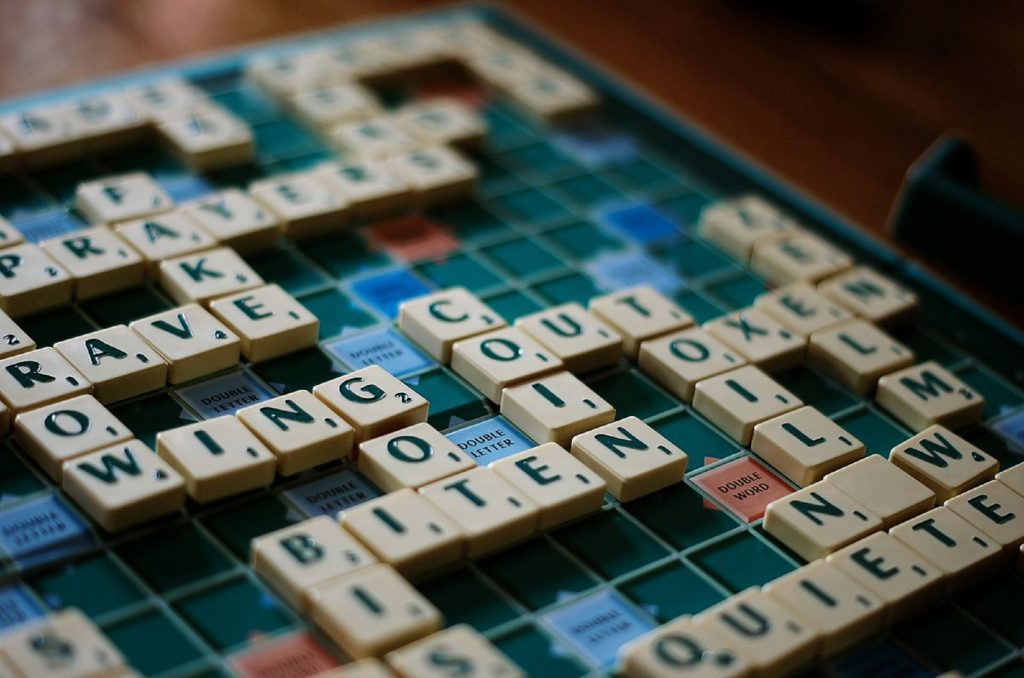
But, more than memorization is the metagame. Knowing what’s in the bag can help you deduce the likelihood of what you’re liable to draw. Learning when to trade in tiles or where the best place is to play a particular word (i.e. – you never want to leave your opponent an opportunity to tack an ‘s’ onto the end of your word to form one of their own) are skills that develop over many plays.
Scrabble is a game that fosters learning and, as you learn, you can’t help but become better at the game. Because of this educational aspect, it has taken on a stigma as a “nerdy” game or a game that’s too hard because it requires you to be smart. And with the strategy involved, it’s also a game that’s very prone to analysis paralysis (AP). When I think about a game that is highly strategic, feared because of its perceived complexity, and rife with AP (which are all some pretty major barriers to entry), I realize that such a game definitely doesn’t belong at the bottom of my step ladder. Scrabble is an amazing game and if it were a brand new game that had just come out within the past few years, I have no doubt that it would have climbed up everyone’s hotness list. So that leaves the question: where do you go when you’re already at the top?
Downwards, that’s where.
Paperback
I absolutely love Paperback and think it’s pretty phenomenal. It belongs on this rung because, when compared to Scrabble, the barriers to entry are much less severe. Just like Scrabble, Paperback rewards having a large vocabulary, but the entire game doesn’t depend on it. Here’s the reason why: wild cards and cubes. To make sense of that statement, let me tell you how the game is played.
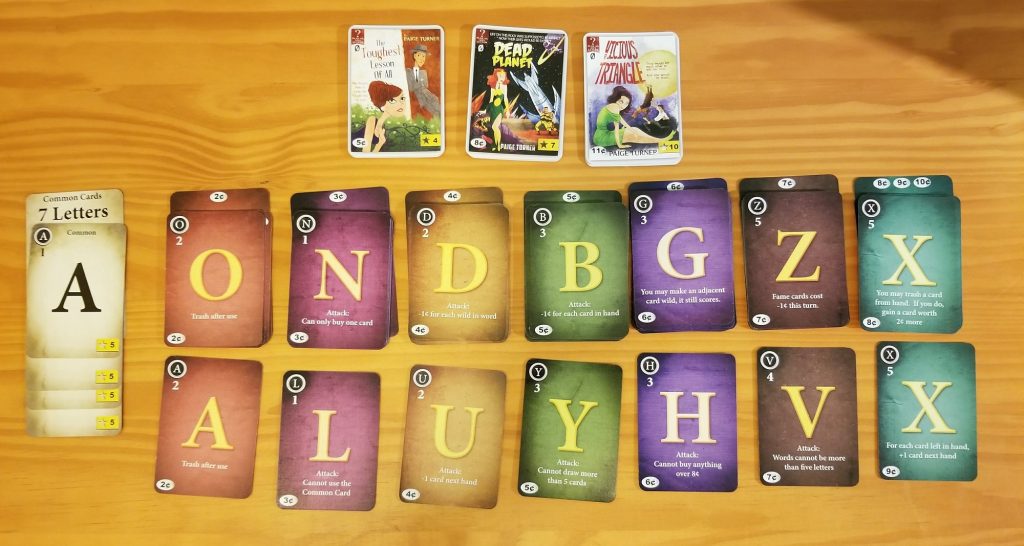
Paperback is a deck building game. Each player begins the game with the exact same cards – 5 wild cards and 5 letters (R,S,T,L, and N). At the beginning of the game, these cards are shuffled into a deck and the player will draw 5 cards from that deck into their hands. Then they will play the cards from their hand in order to form a word. There will always be one Common Vowel card that the player may use as well. With the exception of the wild cards, each letter has an associated value that goes along with it. The wild cards provide no value when used and the other starting letters provide 1 cent each.
In between the players is a tableau of cards which are available for purchase and can be added to the players’ decks in order to give them access to a wider range of letters and letter groupings (2 letters on a single card as opposed to just a single letter). As the game progresses, the opportunity for putting together higher scoring words increases as does the chance to purchase a Fame card or win a Common Vowel card. At the end of the game, the players will count up all of the victory points from all of the Fame cards and Common Vowel cards that they have collected to determine the winner.
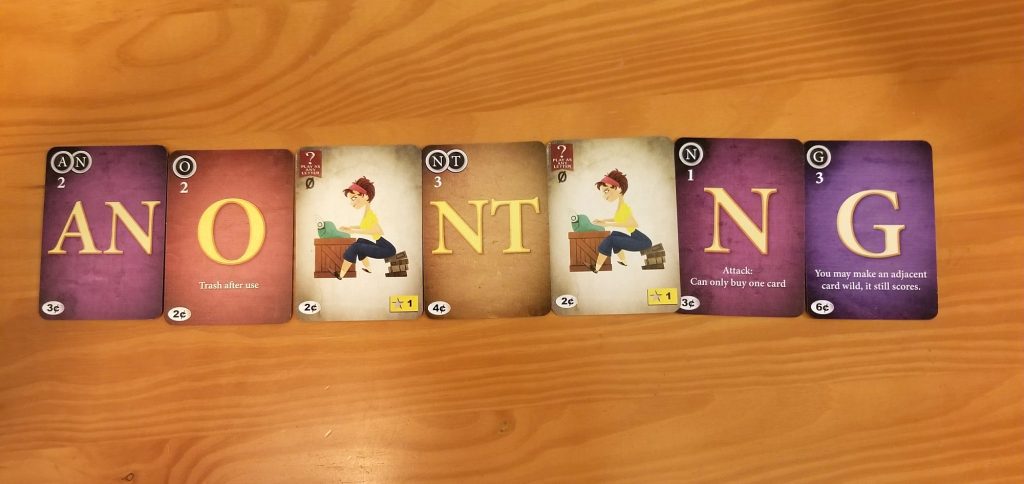
In a game of Scrabble, you are always at the mercy of the letters on your tile rack and the words that have already been played onto the board. It can be brutal when you’re staring at a rack full of consonants without any open vowels to connect your letters to. Paperback eliminates this by providing the players with a plethora of wild cards that they can use. Providing a free vowel for all of the players to use only serves to make things even easier. In Paperback, you don’t have to be a wordsmith to win.
As if that weren’t easy enough, the game also includes some small wooden cubes that are used in several of the variants. One of these variants, which I highly recommend, allows a player to ask their opponents for help if they’re having difficulty coming up with a word. If an opponent’s suggestion is accepted, that opponent receives a wooden cube which they can use on one of their future turns to gain some extra benefit (i.e. – cashing in the cube for extra money). This simple addition to the game helps the players overcome the unequal skill issue that Scrabble suffers from. Two players can be completely mismatched and still have a good time as long as the less skillful player is willing to give the other player a slight advantage.
For those still looking for a lighter word game, the next game on my list is just as fun but really doesn’t require any skill at all.
Unspeakable Words
Unspeakable Words is a card game based on H.P. Lovecraft’s Cthulhu universe. The concept of the game is that each player is a researcher unearthing words not meant for the human mind to understand. As the players’ knowledge grows, they slowly go insane. It’s a game that’s comprised of 96 letter cards, a 20-sided die, and 5 Cthulhu pawns per player. The gameplay is pretty simple.
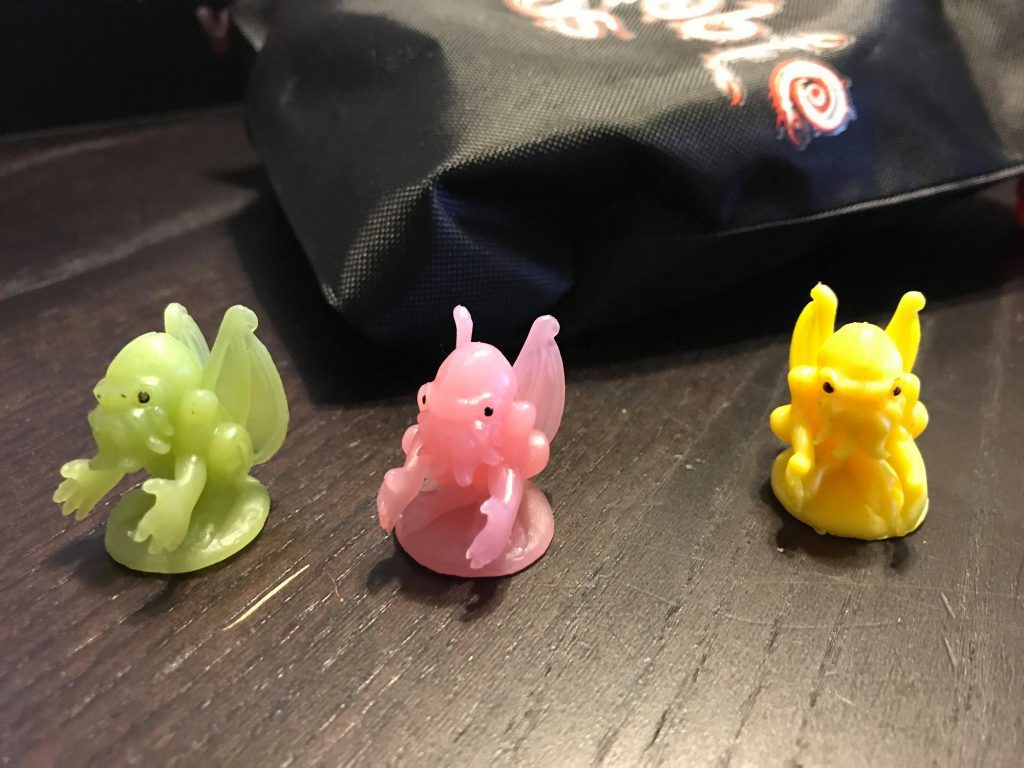
Each player begins the game with a hand of 7 cards and their goal is to play cards in order to form words which will score them points. Each letter has a point value assigned to it equal to the number of angles in the letter. The letter ‘z’, for instance, is worth 2 points while the letter ‘o’ is worth nothing. That player’s score, along with the word, is written down. The word may not be used again by any player for the remainder of the game. Then the player draws back up to 7 cards and performs a sanity check. This involves rolling the 20-sided die and the goal here is to roll equal to or higher than the point value for the word that they played. If they lose the roll, they lose a sanity point and one of their Cthulhu pawns is discarded. If they lose all 5, they’re out of the game. If one player manages to break 100 points without going insane, then they will win the game. Otherwise, the last sane player left will win.
What really makes this game shine is the ‘Unspellable Oath’ variant that’s included that allows you to continue playing the game anyway in, what I would argue is, a much more fun and entertaining capacity if you’re close to going insane. When a player is down to just a single Cthulhu pawn and barely hanging onto their sanity, then they can simply combine any letters together to form total gibberish words. For instance, the player could play the word ‘QRPZN’ and declare that QRPZN is the technical term for the debris at the bottom of an elevator shaft that’s fallen between the cracks over the years. The rules do not require you to come up with a definition but it’s SO MUCH MORE FUN when it’s houseruled that you must.
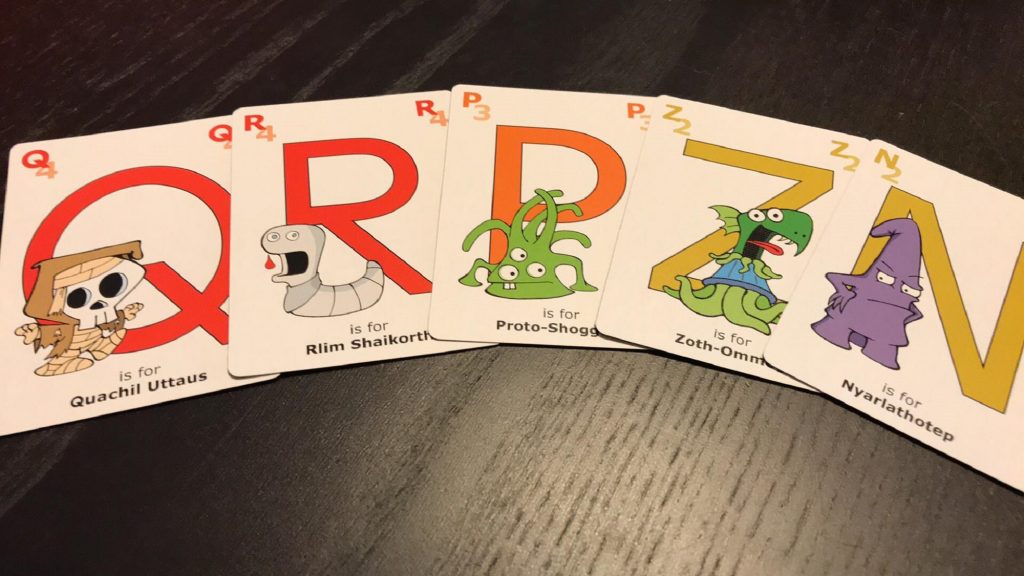
Because Unspeakable Words has you rolling a die to hang onto your sanity, players of any skill level have a chance to do well. In fact, in this game, the smaller the word that you play out, the safer you are. It doesn’t pay to be a wordsmith in this game. And, really, who cares if you go insane? Whenever I play the game, I find it more desirable to ride on the cusp of insanity so that I can just make up utter nonsense. It’s just so much more fun that way! Unspeakable Words just proves that whatever your skill level may be, there’s definitely a wordplay game that’s perfect for you.
Now, go forth and make words!


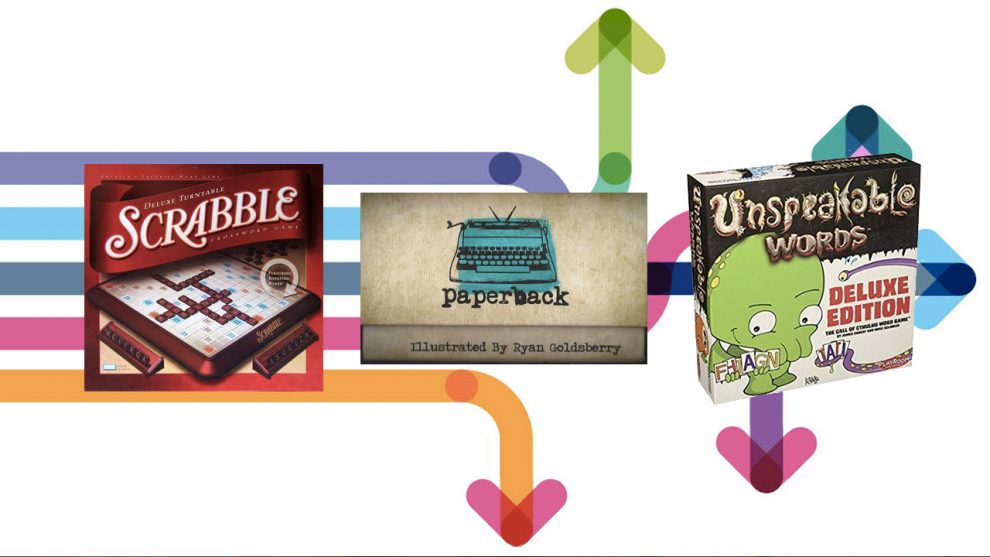
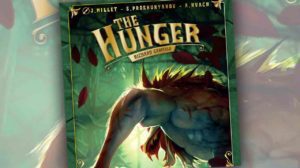
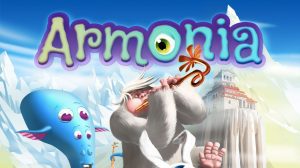

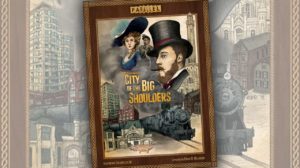




Add Comment